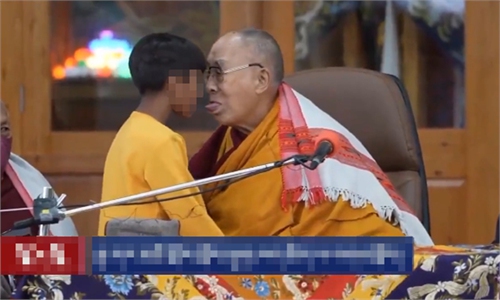
After decades of channeling funds to the Dalai Lama, a moment of a buyer's remorse for the US? Cartoon: Carlos Latuff
Recently, the 87-year-old Dalai Lama became the focus of controversy due to a video showing him asking a young boy to suck his tongue. Afterward, the Dalai Lama's office issued a statement of apology that made light of the situation. Meanwhile, some Western media outlets have attempted to whitewash his behavior, such as the BBC, which claimed that "sticking one's tongue out can be a form of greeting."These media outlets aimed to suggest that the Dalai Lama's actions are justified by Tibetan customs and cultural practices, and therefore forgivable. However, it must be pointed out that this is a complete misrepresentation, as sticking one's tongue out and sucking someone else's tongue are completely different things.
Dismissing these arguments from Western media, a Tibetan scholar who requested anonymity stated that in the Xizang Autonomous Region, sticking one's tongue out can be considered a way of showing respect, but asking someone to suck one's tongue is definitely not a way of showing politeness. In other words, there is no basis in Tibetan traditional customs for the Dalai Lama's request for the young boy to suck his tongue. This behavior is neither hygienic nor decorous, and is contrary to modern civilization.
Nie Shujiang, an associate professor at the Guangming School of Journalism and Communication of China University of Political Science and Law, noted that the behavior of the separatist Dalai Lama is neither a traditional custom nor a sign of respect for the child but shows his low taste, which must be criticized. As international media outlets, BBC and others don't report the truth but are instead trying to cover it up, which will only tarnish their reputation.
Furthermore, the Dalai Lama's office did not mention in its apology statement that "sticking one's tongue out can be a form of greeting," but rather tried to defend the behavior by saying that "his holiness often teases people he meets in an innocent and playful way, even in public and before cameras." Even they dared not use "custom" as an excuse for fear of arousing greater public anger.
These Western media outlets seem to be more anxious than the Dalai Lama himself and his office, using the unrelated custom to whitewash the abnormal behavior of the Dalai Lama, who has been widely condemned. This shows they blatantly place political positions above news facts.
In fact, this is not the first time that Western media outlets have covered up negative news about the Dalai Lama. They have a natural political preference for him. Of course, the most important point is that the Dalai Lama is a card that the West uses to weaken and discredit China at a strategic level, so some Western media have done many things that go beyond normal thinking and disregarded morality in terms of shaping his image.
Nie pointed out that first, they only choose to report on stories where the Dalai Lama conforms to Western values or is critical of China. Second, they create a pious image for him and weave religious myths. Finally, whenever there is a political need, the Dalai Lama can be portrayed as a fighter. In reality, he is just a separatist under the banner of religion.
Many Western media outlets today can hardly be regarded as being independent, fair and objective. Instead, they have become accomplices of some Western countries, led by the US, in their public opinion and political warfare against China. These media outlets have a natural ideological bias, and they are unwilling to view China with a factual perspective, using Western values and cultural prejudices to measure and criticize China.
Moreover, their all-round attacks on China's economic system, political system and foreign policy also reflect the direct influence of the sponsors behind them on the direction and inclination of the reports. It has become their mission to help some Western governments to defame China.
It is very frightening when some Western media completely become political tools. This makes the media lose their factual basis and scale, giving way to political positions. These media outlets should not continue to treat ignorance and prejudice as a noble sentiment and thus report totally untrue to reality.

